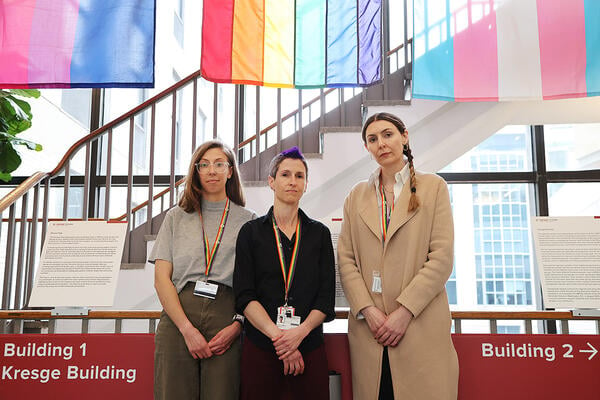Staff and Funding Cuts at the NEH Loom
The Department of Government Efficiency has struck higher ed institutions once again—this time through the National Endowment for the Humanities.
Leaders of the agency—which supports research, innovation and preservation in disciplines related to culture, society and values—told staff members Tuesday that the Trump administration intends to make substantial reductions in staff, slash the agency’s grant programs and rescind grants that have already been awarded.
Humanities advocates don’t know exactly how large the cuts to NEH’s approximately 180-person staff or $78.25 million grant budget will be, but they note that “patterns at other agencies” provide a solid hint. The impact on colleges and universities, they say, would be crushing.
Most Popular
“The NEH supports the full range of humanities work that takes place at higher ed institutions, including support for research and teaching, academic publishing and professional development programs for faculty,” said Stephen Kidd, executive director of the National Humanities Alliance. “Cuts would be particularly devastating, because unlike a lot of private funders, the NEH is more prestige-blind. With its mandate to support the humanities across the country, it’s more likely to give grants to people at smaller and public institutions.”
President Trump has been talking about cutting humanities funding since his first term. Even before whispers about the latest cuts began, humanities scholars expressed concern that new grant-eligibility rules imposed to comply with Trump’s executive order on diversity, equity and inclusion would “undercut NEH’s very mission.”
The president and his cabinet secretaries have already fired or offered buyouts to tens of thousands of government employees in an attempt to hollow out the federal workforce. Two of the most notable cuts impacted the Department of Education—which supports higher ed through federal student aid programs, data collection and accountability measures—and the Department of Health and Human Services, one of the world’s largest research funding sources for colleges and universities.
Now Trump is turning his focus from educational infrastructure and sciences to history, literature and philosophy. Paula Krebs, executive director of the Modern Language Association, believes the move is “sending a message.”
The cut “adds up to a huge net loss for all of higher education” and suggests “it is not worth investing in the study of our culture and the culture of others,” Krebs said. “In the larger context of DOGE cuts, the nation is saying that it’s not worth investing in the study of anything at all.”
The announcement of looming cuts at NEH comes just three weeks after the agency’s Biden-appointed chair, Shelly Lowe, resigned. A citizen of the Navajo Nation, Lowe was the agency’s first Native American chair. Before that, she served as executive director of the Harvard University Native American Program.
The agency is now being led by interim director Michael McDonald, who previously served as its general counsel.
Since Lowe stepped down, DOGE staff members have made several appearances at the office. On Tuesday, they said 70 to 80 percent of the staff would be let go, three staff members told The New York Times. Sources also told the Times that all grants approved by the Biden administration but not yet paid out in full will be canceled.
Neither NEH nor the White House responded to Inside Higher Ed’s request for comment.
Founded in 1965, the NEH has allocated more than $6 billion in grants to museums, historical sites, libraries, state humanities councils and higher education institutions to support a variety of programs.
Kidd, from the Humanities Alliance, said one of the most substantial losses universities could face is funding for curriculum development. In an era when public doubt regarding the value of a college degree is on the rise and skills-based hiring is gaining traction, humanities departments across the country are looking for new ways to mix the classical liberal arts with modern pre-professional training. NEH grants, he said, have been a key source of support for such experimentation.
“These kinds of curricular innovations can help to ensure that students in the humanities have strong pathways to future careers,” Kidd said. It’s “NEH’s support for curricular innovations that might bring the humanities in conversation with business or with biological and health sciences.”
He and other humanities association leaders have also expressed concern about cuts to grants intended to help libraries and museums preserve historical documents, art and other materials that are key to humanities research. The cuts to NEH, they say, will only compound the damage that has already been done by Trump’s executive order to disband the Institute of Museum and Library Services.
“Without funding for preservation, materials will disappear, degrade or not be collected in the first place,” Kidd said. “And once those are lost—they’re lost. The record of human activity is gone.”
Though its mandate is much broader than the humanities, the Association of Public and Land-grant Universities also registered concern about the NEH cuts.
“NEH-funded research documents American history and culture [and] explores the legal and ethical use of emerging technologies such as AI,” said Craig Lindwarm, the association’s senior vice president of governmental affairs. “While undoubtedly reforms to NEH can be made and efficiencies found, cuts to NEH research would undermine progress in these critical areas and beyond.”
To Peter Berkey, executive director of the Association of University Presses, the looming endowment cuts are the epicenter of “a disastrous ripple through the entire scholarly ecosystem.”
“Perhaps most importantly,” he said, “these actions will diminish the very disciplines that drive the development of critical thinking, the understanding of value and the pursuit of justice and democracy among the next generation of scholars and citizens.”











